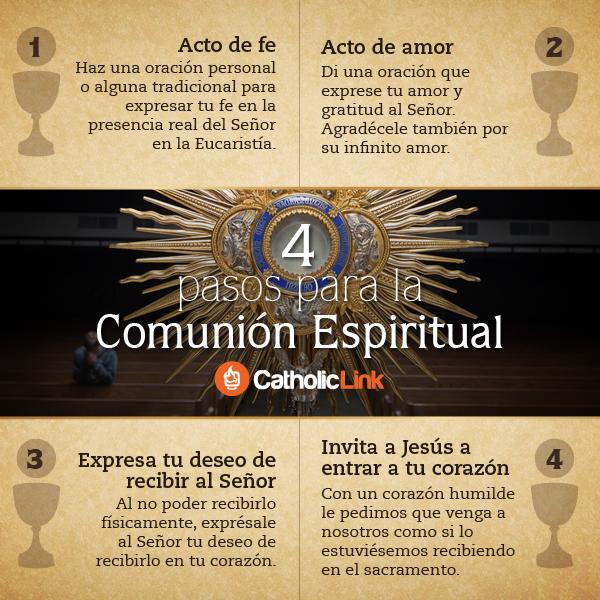News | Noticias | Spirituality | Espiritualidad
Spiritual Communion | Comunión espiritual

You may have heard the term spiritual communion used during the pandemic. This term means that through our prayers we express our relationship with Christ and our desire for a deeper union with him.
This understanding has long been a part of our Church’s tradition. Through baptism, we are already united with Christ as sons and daughters of God. In the Eucharist, we experience a unique union with Christ, by receiving him both physically and spiritually into ourselves.
Spiritual Communion is an ancient practice in the Catholic Church which is relevant, not solely for those concerned about contagious disease, but for all individuals who, due to their unique circumstances, are not able to receive Holy Communion, yet desire the Lord in the Eucharist.
The Catholic Church teaches of the rich benefit of “spiritual Communion.” There are two ways to receive Communion. The superior way, of course, is to receive the Body and Blood of Christ during the Mass. St. Thomas Aquinas referred also to spiritual reception of the Blessed Sacrament, when a person receives Communion in desire, though not in reality.
Aquinas once defined a spiritual Communion as an ardent desire to receive Jesus in the Eucharist at Mass and in lovingly embracing Christ as if we had actually received him. This way a person receives the effect of this sacrament and is spiritually united with Christ through faith and charity.
While spiritual Communion is no replacement for actual reception of the Blessed Sacrament during Mass, there are occasions in which a person is not able to attend Mass, yet truly desires to unite himself or herself most closely to the Lord. Spiritual Communion does not need a particular setting, although the person should remain quiet and in prayer, truly desiring union with Our Lord in the most intimate way. The Church teaches that this is a moment for an individual to receive grace, a participation in the life of God.
In the 1700’s, Saint Alphonsus Liguori, ministering to the isolated people in southern Italy, offered the following prayer, which you may recite in moments of spiritual Communion:
My Jesus, I believe that you are present in the most Blessed Sacrament. I love you above all things and I desire to receive you into my soul. Since I cannot now receive you sacramentally, come at least spiritually into my heart. I embrace you as if you were already there, and unite myself wholly to you. Never permit me to be separated from you. Amen!
Spiritual Communion helps us to cultivate in our hearts a constant desire for the sacrament of the Eucharist at Mass. The ultimate goal of our lives should be communion with God, and an act of spiritual Communion can help a person draw closer to that goal.
—
Special thanks to the Diocese of Saginaw, Michigan, which had most of this information collected together on their web site.

Comunión espiritual significa que a través de la oración expresamos nuestro deseo por una unión más profunda con Cristo. Comunión espiritual no es solo para quienes están preocupados acerca de la enfermedad contagiosa, pero para todos quienes, debido a sus circunstancias personales, no pueden recibir la Comunión, pero desean al Señor en la Eucaristía. Este entendimiento ha sido por mucho tiempo, parte de la tradición de nuestra Iglesia.
Existen dos formas para recibir la Comunión. La mejor, por supuesto, es recibir el Cuerpo y la Sangre de Cristo durante la Misa, experimentando la unión única con Cristo al recibirlo tanto física como espiritualmente en nosotros. Reconociendo que ya estamos unidos con Cristo como hijos e hijas de Dios a través del Bautismo. Santo Tomás de Aquino también se refirió a la recepción espiritual del Santísimo Sacramento, cuando una persona recibe la Comunión con un gran deseo, pero no físicamente. Aquino definió una Comunión espiritual como un ardiente deseo de recibir a Jesús en la Eucaristía y amorosamente abrazando a Cristo como si de hecho lo hubiéramos recibido.
Mientras que la Comunión espiritual no es reemplazo de la recepción real de la Comunión durante la Misa, hay ocasiones cuando una persona no puede asistir a Misa, pero realmente desea unirse más estrechamente al Señor. La Comunión espiritual no requiere un marco particular, aunque la persona debe permanecer tranquila y en oración, verdaderamente deseando la unión con el Señor en la forma más íntima.
San Alfonso María De Ligorio ofreció la siguiente oración, la cual puede rezar en momentos de Comunión espiritual:
Creo, Jesús mío, que estás real y verdaderamente en el cielo y en el Santísimo Sacramento del altar. Te amo sobre todas las cosas y deseo vivamente recibirte dentro de mi alma, pero no pudiendo hacerlo ahora sacramentalmente, ven al menos espiritualmente a mi corazón. Y como si ya te hubiese recibido, te abrazo y me uno del todo a ti. Señor, no permitas que jamás me aparte de ti. ¡Amén!
La Comunión Espiritual nos ayuda a cultivar en nuestros corazones un deseo constante por el sacramento de la Eucaristía en la Misa.




